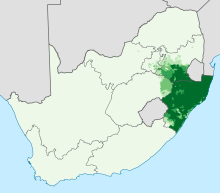User:Mr Ngava/sandbox

UNIQUE AFRICAN TRADITIONS
[edit]THE ZULU PEOPLE
[edit]Zulu culture is deeply rooted in traditions, beliefs, and customs that have been passed down through generations. Here are some key aspects of Zulu culture with references to further explore: 1. Language and communication: The Zulu people predominantly speak isiZulu, a Bantu language that is one of the 11 official languages of South Africa. Language is an important aspect of Zulu culture as it is used to pass down oral histories, stories, and traditions.
2. Traditional clothing and attire: Zulu traditional attire includes colorful garments such as the "isishweshwe" for men and the "isidwaba" for women. These clothing items are often adorned with intricate beadwork, patterns, and symbols that hold cultural significance.
3. Ceremonies and rituals: Zulu culture is rich in ceremonies and rituals that play a significant role in community life. Ceremonies such as weddings, coming-of-age rituals, and ancestral worship are important cultural practices that are meant to honor tradition and bring communities together.
4. Music and dance: Music and dance are integral parts of Zulu culture, with traditional dances such as the "Indlamu" and "Umqombothi" showcasing the rhythmic and energetic movements of the Zulu people. Music and dance are used to celebrate, communicate, and express cultural identity.
5. Art and craft: Zulu art and craft traditions include beadwork, pottery, weaving, and carving. These artistic forms are not only decorative but also carry symbolic meaning and cultural significance. Zulu artistry is a way of preserving heritage and showcasing creativity.

By exploring these aspects of Zulu culture and references, one can gain a deeper understanding of the rich traditions, beliefs, and practices that are central to the identity of the Zulu people.
THE TSWANA
[edit]
The Tswana people are a Bantu ethnic group native to Southern Africa, predominantly found in Botswana and South Africa. Tswana culture is rich and characterized by a variety of traditions, religious beliefs, dances, myths, and other cultural activities. Here is an overview of some key aspects of Tswana culture:
Religion
Traditional Tswana religion is based on a belief in a supreme being, Modimo, who is the creator and overseer of the universe.
Ancestors are also revered in Tswana culture, with rituals and ceremonies often performed to honor and communicate with them.
Elements of Christian beliefs have also been integrated into Tswana religious practices due to the influence of missionaries.
Dance
Dance plays a significant role in Tswana culture and is used in various social and ceremonial contexts.
Traditional Tswana dances are often accompanied by drums, singing, and clapping. The movements are rhythmic and expressive, telling stories or conveying emotions.
Dances like "Setapa" and "Tswana Wedding Dance" are well-known traditional Tswana dances.
Myths and Legends
Tswana mythology is rich with stories, legends, and beliefs that have been passed down orally through generations.
Folktales often feature animals as characters and convey moral lessons or explain natural phenomena.
Myths and legends also serve to explain the origin of certain customs or practices within the Tswana culture.
Cultural Activities
Tswana people have a strong sense of community and often participate in communal activities and ceremonies.
Events like weddings, initiation ceremonies, and funerals are important cultural milestones that involve various rituals and traditions.
Traditional attire, such as the colorful Tswana attire worn during special occasions, plays a significant role in maintaining cultural identity.

Arts and Crafts
Tswana culture is known for its artistic traditions, including beadwork, pottery, weaving, and woodcarving.
These crafts often feature intricate designs and patterns that hold cultural significance and are passed down through generations.
Language
The Tswana language, Setswana, is central to Tswana culture and serves as a unifying factor among Tswana people.

Proverbs and storytelling are important aspects of Setswana culture, embodying traditional wisdom and values
